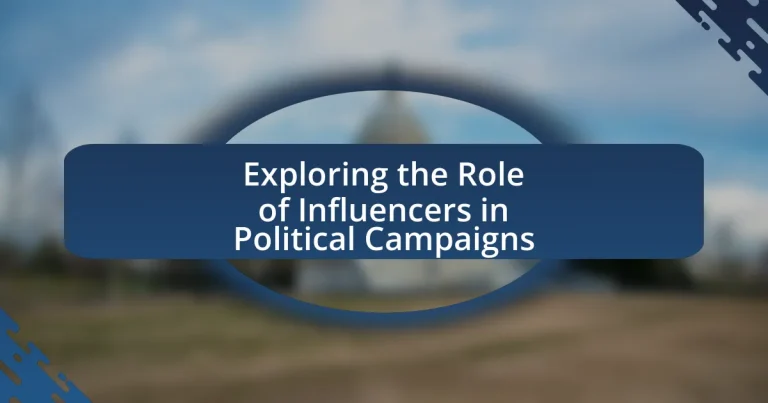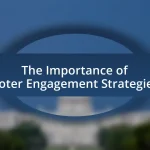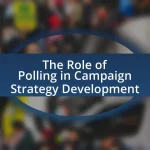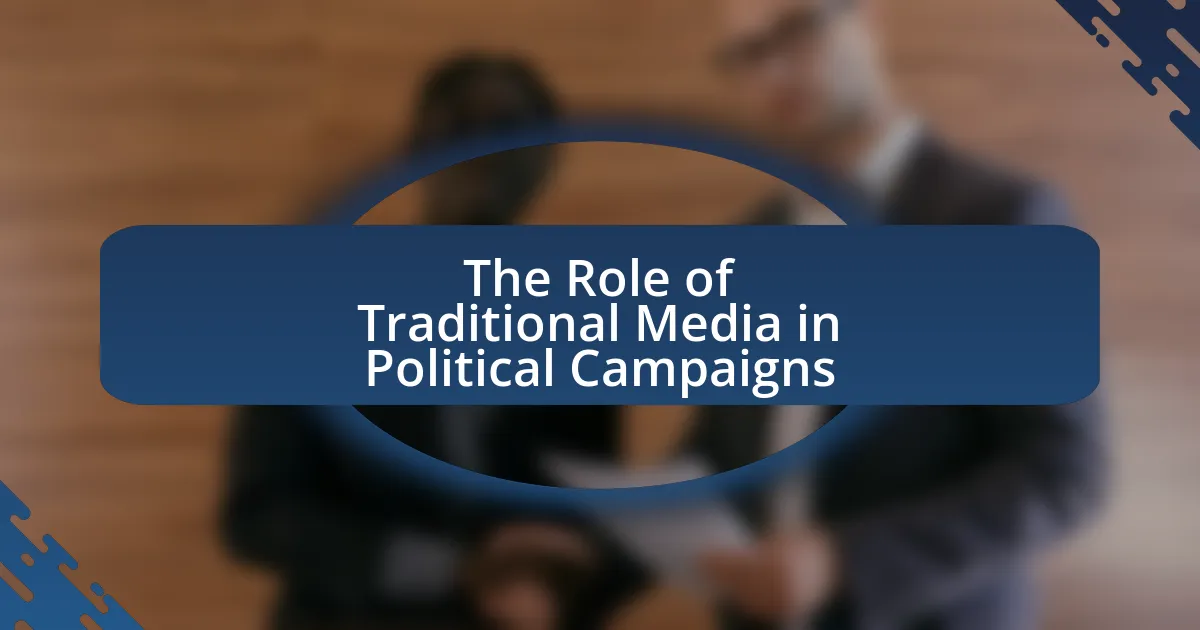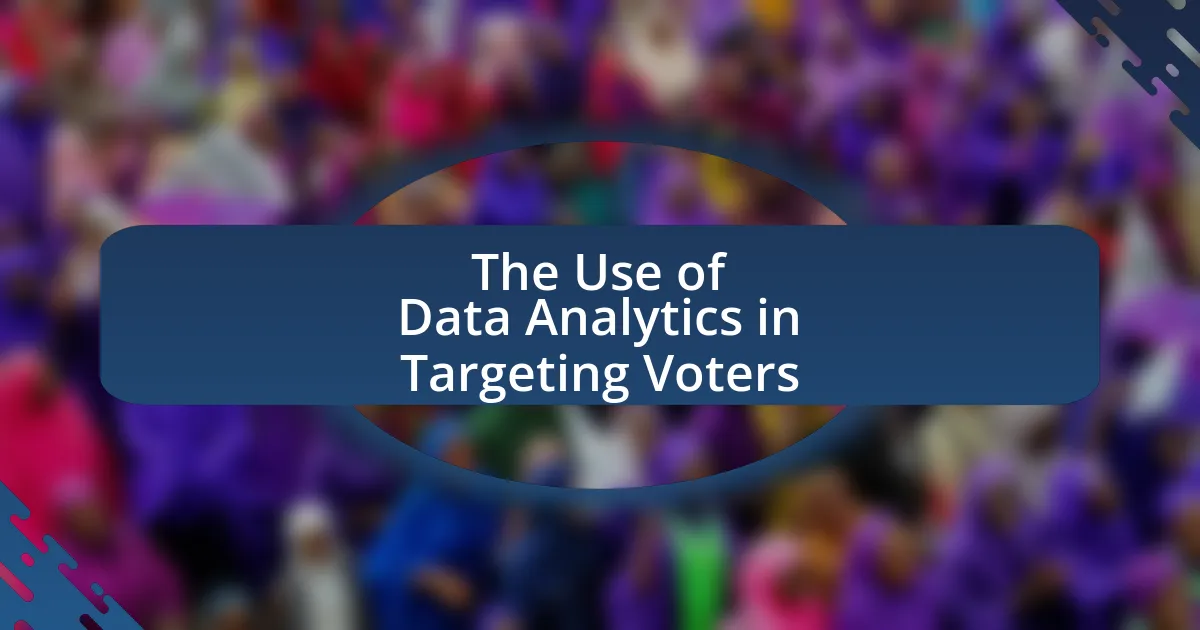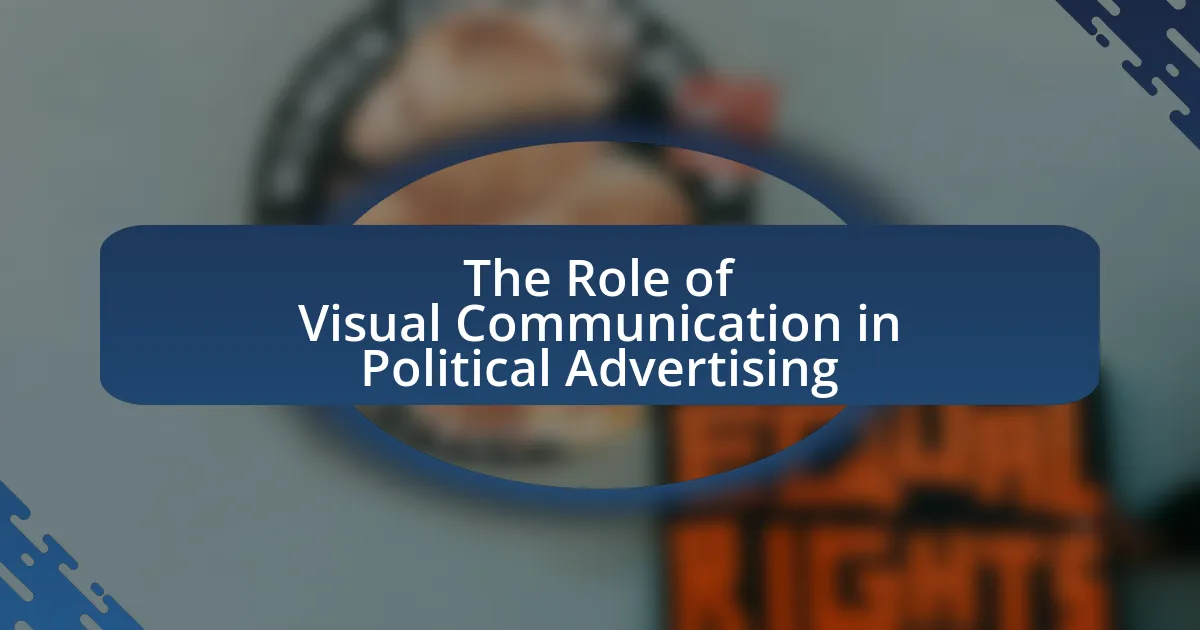The article explores the significant role of influencers in political campaigns, highlighting their ability to shape public opinion and mobilize voters through social media. It examines how influencers impact voter behavior, the psychological factors that enhance their effectiveness, and the various types of influencers involved in political messaging. Additionally, the article discusses the challenges and ethical concerns associated with influencer involvement in politics, as well as future trends and best practices for campaigns working with influencers. Key insights include the distinction between micro and macro-influencers, the importance of authenticity, and the regulatory landscape governing influencer marketing in political contexts.
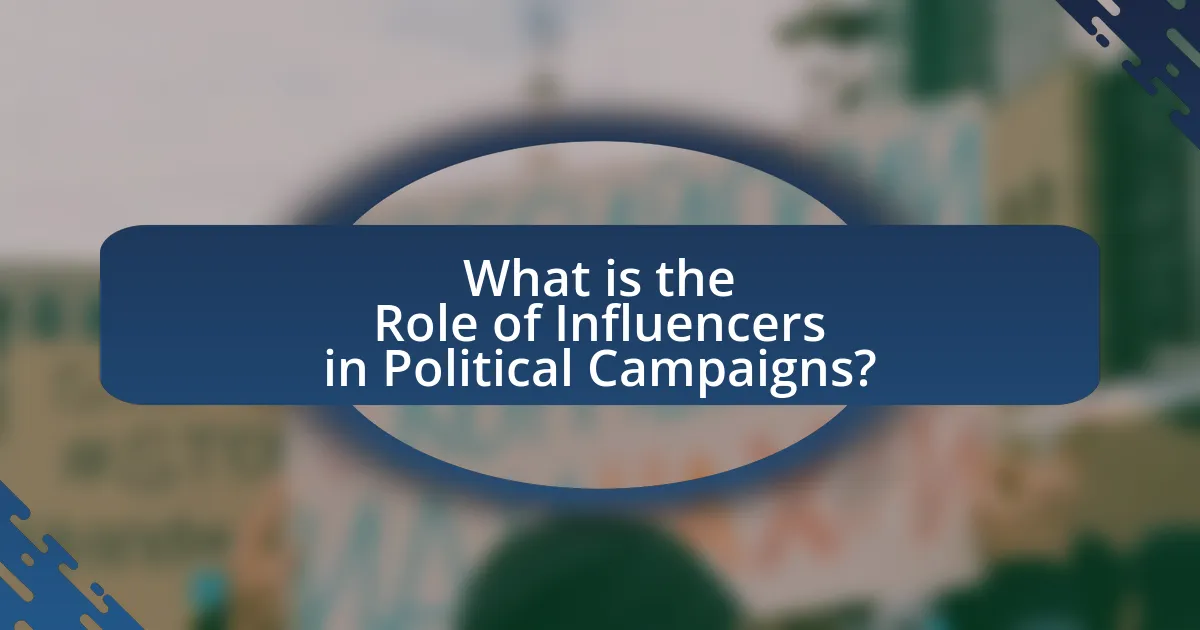
What is the Role of Influencers in Political Campaigns?
Influencers play a significant role in political campaigns by shaping public opinion and mobilizing voters through their extensive reach on social media platforms. They leverage their credibility and follower engagement to promote candidates, policies, and political messages, often targeting specific demographics that align with their audience. For instance, during the 2020 U.S. presidential election, influencers were instrumental in increasing voter turnout among younger populations, with studies indicating that 50% of young voters were influenced by social media content. This demonstrates that influencers can effectively bridge the gap between traditional political messaging and the digital landscape, making them valuable assets in modern political strategies.
How do influencers impact voter behavior during campaigns?
Influencers significantly impact voter behavior during campaigns by shaping public opinion and increasing voter engagement. Their ability to reach large audiences through social media platforms allows them to disseminate political messages effectively, often swaying undecided voters. For instance, a study by the Pew Research Center found that 55% of social media users aged 18-29 reported that they had seen political content shared by influencers, which influenced their voting decisions. Additionally, influencers often create relatable content that resonates with younger demographics, making political issues more accessible and engaging. This engagement can lead to higher voter turnout, as influencers mobilize their followers to participate in elections.
What psychological factors make influencers effective in political messaging?
Influencers are effective in political messaging primarily due to their ability to establish trust and relatability with their audience. This trust is often built through perceived authenticity, where followers view influencers as genuine and relatable figures rather than traditional politicians. Research indicates that 70% of millennials trust influencers more than traditional celebrities, which enhances the effectiveness of political messages they convey. Additionally, influencers utilize social proof, where their endorsement of a political message can lead to increased acceptance among their followers, as people tend to align with the opinions of those they admire. This combination of trust, relatability, and social proof significantly amplifies the impact of political messaging delivered by influencers.
How do influencers shape public opinion on key issues?
Influencers shape public opinion on key issues by leveraging their platforms to disseminate information and engage their audiences. They often possess a strong connection with their followers, which allows them to sway perceptions and attitudes toward specific topics. For instance, studies have shown that 70% of teenagers trust influencers more than traditional celebrities, indicating their significant impact on younger demographics. Additionally, influencers can mobilize their audience for social causes, as seen in campaigns like the Ice Bucket Challenge, which raised awareness and funds for ALS. This ability to create viral content and foster community engagement further solidifies their role in shaping public discourse on critical issues.
What types of influencers are involved in political campaigns?
Political campaigns involve several types of influencers, including traditional celebrities, social media influencers, political activists, and thought leaders. Traditional celebrities, such as actors and musicians, leverage their fame to attract attention and support for candidates. Social media influencers, who have substantial followings on platforms like Instagram and TikTok, engage younger demographics and can sway public opinion through relatable content. Political activists, often grassroots organizers, mobilize communities and advocate for specific issues, while thought leaders provide expert opinions and analysis that can shape political discourse. Each type of influencer plays a distinct role in amplifying messages and driving voter engagement during campaigns.
What distinguishes micro-influencers from macro-influencers in politics?
Micro-influencers in politics are distinguished from macro-influencers primarily by their audience size and engagement levels. Micro-influencers typically have between 1,000 to 100,000 followers, allowing for more targeted and personal interactions with their audience, which often leads to higher engagement rates. In contrast, macro-influencers possess larger followings, often exceeding 100,000 followers, which can result in broader reach but potentially lower engagement per follower. Research indicates that micro-influencers can achieve engagement rates of up to 7% compared to macro-influencers, whose rates may drop to around 1-3%. This difference in engagement is crucial in political campaigns, where personal connections and trust can significantly influence voter behavior.
How do celebrity endorsements differ from grassroots influencers?
Celebrity endorsements differ from grassroots influencers primarily in their reach and authenticity. Celebrity endorsements leverage the fame and visibility of well-known figures to attract a broad audience quickly, often resulting in immediate brand recognition and influence. In contrast, grassroots influencers typically engage with smaller, niche communities, fostering deeper connections and trust through relatable content and personal experiences. Research indicates that consumers often perceive grassroots influencers as more authentic, with a 2021 study by the Digital Marketing Institute showing that 70% of consumers trust peer recommendations over celebrity endorsements. This distinction highlights the varying effectiveness of each approach in political campaigns, where authenticity can significantly impact voter engagement and trust.
Why are influencers increasingly used in political campaigns?
Influencers are increasingly used in political campaigns because they effectively engage and mobilize younger voters through social media platforms. Their ability to reach large, targeted audiences allows political messages to spread rapidly and resonate with demographics that traditional media may not effectively reach. For instance, a study by the Pew Research Center in 2021 found that 84% of adults aged 18-29 use social media, making it a crucial channel for political outreach. Additionally, influencers often have established trust and credibility with their followers, which can enhance the perceived authenticity of political messages. This combination of reach and trust makes influencers a valuable asset in modern political campaigning.
What advantages do influencers provide over traditional campaign methods?
Influencers provide targeted reach and authentic engagement that traditional campaign methods often lack. Unlike traditional advertising, which broadcasts messages to a broad audience, influencers connect with specific demographics through established trust and relatability. Research indicates that 49% of consumers depend on influencer recommendations for their purchasing decisions, showcasing the effectiveness of influencer marketing in driving engagement and conversion rates compared to conventional methods. Additionally, influencers can create personalized content that resonates more deeply with their followers, leading to higher levels of interaction and brand loyalty.
How do social media platforms facilitate influencer engagement in politics?
Social media platforms facilitate influencer engagement in politics by providing a direct communication channel between influencers and their audiences, enabling real-time interaction and content sharing. These platforms allow influencers to amplify political messages, mobilize followers, and create viral campaigns, which can significantly impact public opinion and voter behavior. For instance, during the 2020 U.S. presidential election, platforms like Instagram and Twitter saw influencers using their reach to encourage voter registration and participation, demonstrating their effectiveness in shaping political discourse.
How do influencers collaborate with political campaigns?
Influencers collaborate with political campaigns by leveraging their social media platforms to promote candidates, policies, and voter engagement initiatives. They create content that resonates with their audience, often using storytelling and personal experiences to connect emotionally with potential voters. For instance, during the 2020 U.S. presidential election, influencers like Bella Thorne and Lizzo used their platforms to encourage voter registration and participation, significantly impacting young voter turnout. Research indicates that campaigns utilizing influencer partnerships can increase engagement rates by up to 60%, demonstrating the effectiveness of this collaboration in reaching targeted demographics.
What strategies do campaigns use to leverage influencer partnerships?
Campaigns leverage influencer partnerships through targeted audience engagement, authentic content creation, and strategic messaging alignment. By selecting influencers whose followers align with the campaign’s target demographic, campaigns can effectively reach and engage potential voters. Authentic content, often created in collaboration with influencers, resonates more with audiences, fostering trust and relatability. Additionally, aligning the influencer’s messaging with the campaign’s core values ensures consistency and enhances the overall impact. Research indicates that campaigns utilizing influencer partnerships can increase voter engagement by up to 30%, demonstrating the effectiveness of these strategies in mobilizing support.
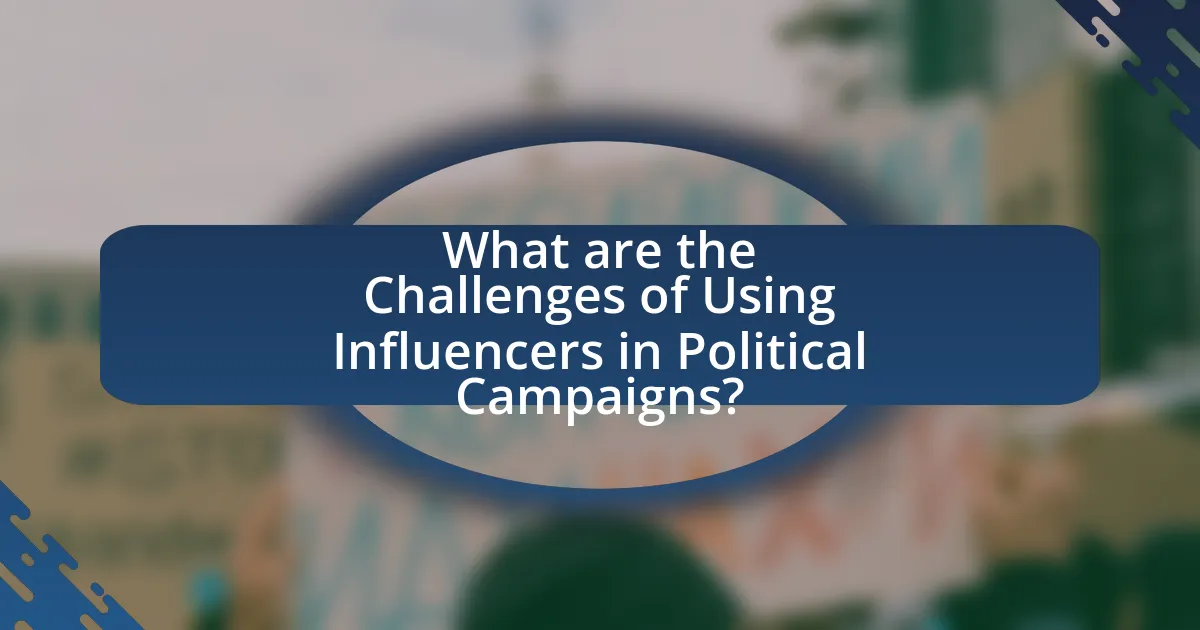
What are the Challenges of Using Influencers in Political Campaigns?
The challenges of using influencers in political campaigns include credibility issues, audience alignment, and regulatory compliance. Credibility can be compromised if influencers are perceived as inauthentic or overly commercialized, leading to skepticism among their followers. Audience alignment is crucial; if the influencer’s demographic does not match the target voter base, the campaign may fail to reach its intended audience effectively. Additionally, regulatory compliance poses a challenge, as political advertising laws require transparency about paid endorsements, which can complicate influencer partnerships. These factors can significantly impact the effectiveness of influencer strategies in political contexts.
What ethical concerns arise from influencer involvement in politics?
Influencer involvement in politics raises several ethical concerns, primarily related to misinformation, transparency, and the potential for manipulation. Misinformation can spread rapidly through influencers’ platforms, leading to the dissemination of false narratives that can mislead the public. For instance, a study by the Pew Research Center found that 64% of Americans believe that misinformation is a major problem in political discourse, highlighting the risk posed by influencers who may not fact-check their content.
Transparency is another critical issue, as influencers often do not disclose their financial ties to political campaigns or organizations, which can create conflicts of interest. The Federal Trade Commission mandates that influencers disclose paid partnerships, yet compliance is inconsistent, leading to questions about the authenticity of their endorsements.
Additionally, the potential for manipulation arises when influencers leverage their platforms to sway public opinion without accountability. This concern is underscored by research from the Oxford Internet Institute, which indicates that social media influencers can significantly impact voter behavior, raising ethical questions about the responsibility they hold in shaping political narratives.
How can misinformation spread through influencer channels?
Misinformation can spread through influencer channels primarily due to the influencers’ large and engaged audiences, which amplify false narratives quickly. Influencers often share content without thorough fact-checking, leading to the rapid dissemination of misleading information. For instance, a study by the Pew Research Center found that 70% of social media users encounter misinformation, and influencers, with their credibility and reach, can inadvertently validate and propagate these inaccuracies. Additionally, algorithms on platforms like Instagram and TikTok favor engaging content, which can include sensationalized or misleading posts, further enhancing the spread of misinformation.
What regulations govern influencer marketing in political contexts?
Influencer marketing in political contexts is primarily governed by regulations set forth by the Federal Election Commission (FEC) in the United States, which mandates transparency in political advertising. These regulations require influencers to disclose any financial compensation or material benefits received for promoting political candidates or causes, ensuring that audiences are aware of the promotional nature of the content. Additionally, the Federal Trade Commission (FTC) enforces guidelines that require clear disclosures when influencers engage in paid partnerships, which applies to political endorsements as well. These regulations aim to maintain integrity in political communication and protect consumers from misleading information.
How do influencers manage their credibility during political campaigns?
Influencers manage their credibility during political campaigns by maintaining transparency, aligning with authentic causes, and engaging in fact-checking. Transparency involves openly disclosing partnerships and sponsorships, which helps build trust with their audience. For instance, influencers often use hashtags like #ad or #sponsored to indicate paid promotions, ensuring followers are aware of their affiliations. Aligning with authentic causes means that influencers choose to support political messages or candidates that resonate with their personal beliefs, which enhances their perceived sincerity. Additionally, influencers often engage in fact-checking by verifying information before sharing it, thereby reducing the spread of misinformation and reinforcing their reliability. This approach is supported by studies indicating that audiences are more likely to trust influencers who demonstrate honesty and integrity in their communications.
What steps do influencers take to maintain authenticity with their audience?
Influencers maintain authenticity with their audience by consistently sharing personal experiences and opinions that resonate with their followers. They prioritize transparency by disclosing partnerships and sponsored content, which builds trust. Additionally, influencers engage with their audience through comments and direct messages, fostering a sense of community. Research indicates that 86% of consumers value authenticity in influencer marketing, highlighting the importance of genuine interactions. By aligning their content with their values and the interests of their audience, influencers can effectively sustain their credibility and connection.
How do influencers respond to backlash or controversy in political messaging?
Influencers typically respond to backlash or controversy in political messaging by issuing clarifications, apologies, or reframing their messages. For instance, when faced with criticism, influencers may release statements that address the concerns raised, often emphasizing their intent or providing additional context to their original message. Research indicates that influencers who engage transparently with their audience during controversies can mitigate negative perceptions and maintain their follower base. A study by the Pew Research Center found that 70% of social media users appreciate when influencers acknowledge mistakes and take responsibility, which can lead to increased trust and loyalty among followers.
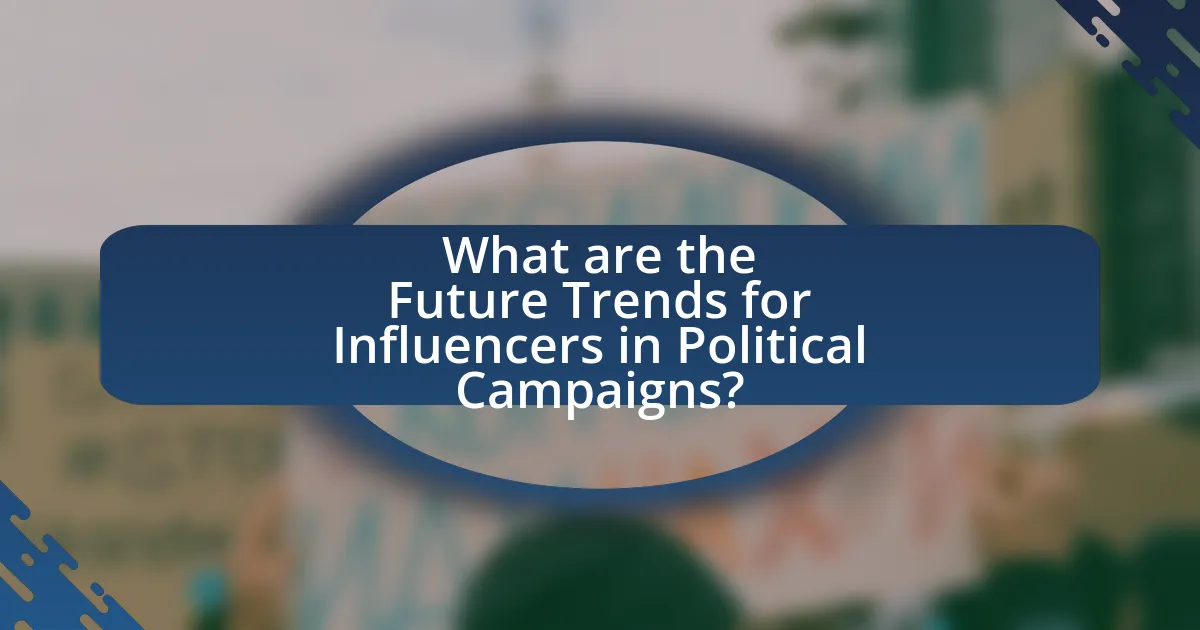
What are the Future Trends for Influencers in Political Campaigns?
Future trends for influencers in political campaigns include increased integration of data analytics, a focus on authenticity, and the rise of micro-influencers. Data analytics will enable campaigns to target specific demographics more effectively, enhancing engagement and voter mobilization. Authenticity is becoming crucial as audiences demand genuine connections; influencers who maintain transparency and align with their values will likely resonate more with voters. Additionally, micro-influencers, who often have higher engagement rates despite smaller followings, are expected to play a significant role in grassroots movements, as they can foster community trust and drive localized support. These trends reflect the evolving landscape of political communication, where digital strategies are increasingly vital for campaign success.
How is technology changing the landscape for political influencers?
Technology is transforming the landscape for political influencers by enabling direct communication and engagement with audiences through social media platforms. These platforms allow influencers to disseminate information rapidly, mobilize supporters, and shape public opinion in real-time. For instance, during the 2020 U.S. presidential election, candidates utilized platforms like Twitter and Instagram to reach millions of voters directly, bypassing traditional media channels. This shift has been supported by data showing that 69% of adults in the U.S. use social media, making it a critical tool for political outreach. Additionally, technology facilitates targeted advertising, allowing influencers to tailor messages to specific demographics, thereby increasing the effectiveness of their campaigns.
What role will artificial intelligence play in influencer marketing for politics?
Artificial intelligence will significantly enhance influencer marketing for politics by enabling targeted audience engagement and data-driven decision-making. AI algorithms can analyze vast amounts of social media data to identify key influencers whose audiences align with specific political messages, thereby optimizing campaign strategies. For instance, a study by the Pew Research Center found that 70% of voters are influenced by social media, highlighting the importance of leveraging AI to pinpoint effective influencers. Additionally, AI can track engagement metrics in real-time, allowing political campaigns to adjust their messaging and influencer partnerships based on audience reactions, ultimately increasing the effectiveness of political outreach efforts.
How might emerging social media platforms impact influencer strategies?
Emerging social media platforms significantly impact influencer strategies by providing new avenues for engagement and audience targeting. These platforms often feature unique algorithms and user demographics that can alter how influencers create content and connect with their followers. For instance, TikTok’s short-form video format encourages influencers to adopt more creative and spontaneous content styles, which can lead to higher engagement rates compared to traditional platforms like Instagram or Facebook. Additionally, the rise of niche platforms allows influencers to target specific communities more effectively, enhancing their relevance and impact within those groups. This shift is supported by data indicating that 60% of marketers believe that niche platforms yield better engagement than mainstream ones, highlighting the importance of adapting strategies to leverage these emerging channels.
What best practices should political campaigns follow when working with influencers?
Political campaigns should prioritize authenticity and alignment with influencers to effectively engage their target audience. Campaigns must select influencers whose values and messaging resonate with their political objectives, ensuring a genuine connection with their followers. For instance, a study by the Pew Research Center indicates that 70% of social media users trust influencers more than traditional celebrities, highlighting the importance of credibility in influencer partnerships. Additionally, campaigns should establish clear communication and expectations with influencers, including content guidelines and timelines, to maintain consistency and coherence in messaging. Engaging influencers in two-way conversations can also enhance collaboration and foster a sense of community among supporters.
How can campaigns effectively measure the impact of influencer partnerships?
Campaigns can effectively measure the impact of influencer partnerships by utilizing key performance indicators (KPIs) such as engagement rates, reach, and conversion metrics. Engagement rates, which include likes, shares, and comments, provide insight into how well the audience interacts with the content shared by influencers. Reach measures the total number of unique users who see the influencer’s content, indicating the potential audience size. Conversion metrics, such as click-through rates and the number of actions taken (e.g., signing a petition or donating), directly reflect the effectiveness of the influencer’s message in driving desired outcomes. According to a study by the Digital Marketing Institute, campaigns that track these metrics can see a 30% increase in effectiveness when evaluating influencer partnerships.
What guidelines should influencers adhere to when promoting political messages?
Influencers should adhere to transparency, authenticity, and ethical standards when promoting political messages. Transparency involves clearly disclosing any sponsorships or partnerships related to political content, as mandated by the Federal Trade Commission (FTC) guidelines, which require influencers to inform their audience about paid promotions. Authenticity is crucial; influencers must genuinely support the political messages they promote to maintain credibility with their audience. Ethical standards include avoiding misinformation and ensuring that the content aligns with factual information, as misleading claims can undermine democratic processes. These guidelines help maintain trust and integrity in political discourse.
